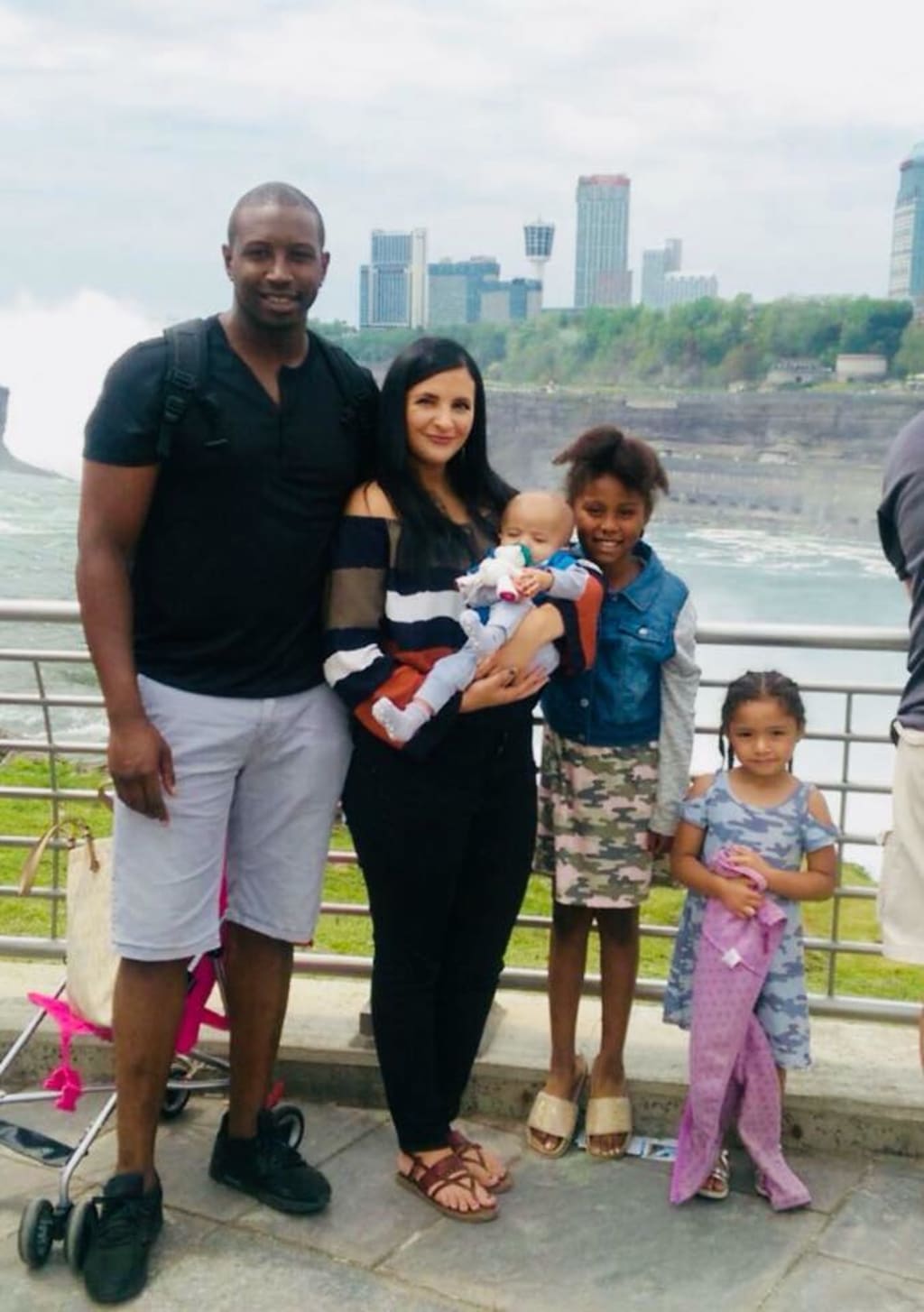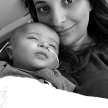The Answer, the Diagnosis, the Heartbreak
Continued from "1 in 150,000" 3/3

After Ryder's liver biopsy clarified that he didn't have Biliary Atresia, I went through a stage of resentment. Don't get me wrong, I was beyond grateful that he wouldn't need a liver transplant, but I began to get frustrated with the hospital. I didn't have much confidence that we would get our answer with the genetics test because initially, his liver specialist requested the test for "Alagille Syndrome". Both his dad and I did some research and looked more into this genetic disorder, and the symptoms simply did not match with our son. I thought this genetics test would end up being a waste of time. About a month after his test, I received a call from his liver specialist. The results were in and as I suspected he didn't have Alagille Syndrome. What his specialist did seem concerned about was something called a "Pex1 Gene." It's a shortened term for Peroxisomes, which is an important organelle found in all eukaryotic cells. They are involved in the catabolism of very long chain fatty acids, branched chain fatty acids. This Pex1 gene is basically an important part of all major organ systems to function properly. What this test showed was that Ryder had an elevated amount of "Long chain fatty acids" which meant there was a mutation in his Pex1 Gene. His specialist said not to worry just yet, they were going to send his results to a geneticist to see if there was any concern. He said, "There are people walking around every day with highly elevated long chain fatty acids that function normally and don't know." The phone call ended with me being a bit confused but I wasn't too worried being that his specialist wasn't worried just yet.
However, immediately I turned to google to search "Pex1 gene disorders" and came across Zellweger Spectrum Syndrome. I was completely horrified. These children suffered from everything you could think of. Cirrhosis of the liver, complication with lungs and heart. Regular seizures. Some were blind, some were deaf, and some were both. But the most horrifying statement I saw was, "Infants are not expected to survive past their first year of life." I started sobbing. Ryder hadn't even gotten a diagnosis and I was crying hysterically. What kind of horrible disease makes a child suffer so much for just a year of their life? Ryder couldn't have that. There was NO WAY my five-month-old son was dying. He didn't have most of the symptoms that were listed, and I didn't think he was that sick. I decided to quit the whole google self-diagnosis and just wish and pray for the best. By the time we saw his liver specialist again (around 2-3 weeks later), I had completely convinced myself that Ryder didn't have Zellweger Spectrum Syndrome. There were just too many factors against it. Still, I was sick to my stomach with nerves waiting for what his specialist had to say.
His specialist did his regular evaluation and then prepared me for the news. "Heimler Syndrome, have you heard of it before?" I had the biggest sigh of relief in my entire life when I heard those words. No, I hadn't heard of it, but surely it was better than what I was looking at before. He informed me that Heimler Syndrome went along with Hearing Loss, Pex1 Gene mutations, and nail and teeth malformations. This was not fatal. I jokingly told him that I had scared myself when researching and came across Zellweger Spectrum Syndrome. I asked him for his honest input and said I was worried about the prognosis. I asked, "Is this something we might be looking at?" He said, "No." He said he sent the results off to the Peroxisomal Expert and he did not think we had anything to worry about as far as Zellweger Spectrum Syndrome. The next step was for us to talk to a geneticist about the results for a better understanding. This was scheduled for late June. I cried of happiness and relief that night. Our world was looking brighter than ever. In the meanwhile, Ryder was receiving ECI (early childhood intervention) therapies to help him with his milestones. He was very behind but was progressing a little at a time. He also had a private nurse come to check on him once a week to make sure everything was okay, and that his feeding tube was working properly. He was discharged at the beginning of May once his liver specialist decided it was okay for him to be released from the feeding tube.
Everything was smooth sailing.
It wasn't until the day of his genetics appointment that my life came spiraling down.
A few days before the appointment I received a call from his liver specialist. He told me that some new results came in from his genetics testing and his "very long chain fatty acids" were a lot more elevated than they initially thought. This caused him some concern but not too much; he said the geneticist would explain it better at the appointment. He also said to be careful because geneticists tend to drop their diagnosis "like a bomb." I now know this had been my warning.
The day had come and I sat there not too upset. I was pretty much expecting to go over the results and to hear more about this Heimler Syndrome.
She greeted us, evaluated Ryder and had us participate in a questionnaire. Now it was time for the results. "Zellweger Spectrum Syndrome—Peroxisomal Biogenesis Disorder" was all I could manage to register. "What?" was all that could come out of my mouth. She explained that with the results of the genetic testing, his hearing loss, global developmental delay, and failure to thrive, all were in favor of his new diagnosis. I asked about Heimler Syndrome. She said that was a part of the Peroxisomal Biogenesis Disorders, but it was at the very mild spectrum and with everything going on with Ryder he was leaning toward the intermediate/ middle of Zellweger Spectrum Syndrome. I was devastated. My world came to an end, yet I was sitting there without an expression on my face. Somehow I managed to muster the courage to ask about his prognosis. I told her I had already done research and saw that they don't make it past their first year. She assured me that children who pass as infants are affected on the severe side, and judging by how active Ryder was, he wasn't severe. She said, with proper care and medicine, "He could live many, many years" and that we won't for sure know just how badly this disorder will affect him until he reaches the age of 4 or 5. As soon as I left the room, I ran to the bathroom and just cried. I felt so many emotions. Confusion, desperation, betrayal. How could his liver specialist be so convinced it wasn't Zellweger and yet the geneticist diagnosed him as such? I was pissed but I was also in denial. She had to have been wrong. She just met us and his liver specialist had been seeing us for several months! He wouldn't have told me that if he hadn't known for a fact that it wasn't his diagnosis!! I needed answers.
After the visit, I sent him an email letting him know about the new diagnosis. He responded in shock and confusion and said: "I don't understand why they came up with that conclusion. I spoke with the expert a few weeks ago and he said that wasn't what we were looking at." He went on to say that she wasn't the expert and was just a general geneticist and told me to hold off until we could speak with the expert. That was set for late June. We had already planned to visit his family in New York and I asked if it was okay for us to take him, and we got the okay. We had a wonderful time meeting new family and enjoying ourselves. It was so nice it almost seemed as if everything was normal. In that week, everything WAS normal. No stress, no worries, no hospital visits. It was perfect. I was feeling pretty optimistic; Ryder wasn't having any issues in the following month. We did have a seizure scare but an EEG was done and no seizure-like activity was found. Everything seemed to be okay. Again, I was convincing myself that this new diagnosis had to be wrong. Weeks passed and it was finally time to speak with the expert. I was nervous, hopeful, excited and scared all at the same time. I felt like we would finally get the answers we needed.
The visit didn't go as I had hoped. The visit started off with the expert asking questions and looking over Ryder's chart. He eventually stated that with all the labs and other diagnoses Ryder has, he believes Zellweger is the correct diagnosis. I was mad. I asked why the change of mind. Why did he tell our liver specialist there was nothing to be concerned about? This is a huge diagnosis to play around with. He apologized and took credit for the wrongdoing. He said there had never been a patient referred to Zellweger from a cholestasis (liver) diagnosis before. He said after reviewing the bigger picture and lab results he is convinced he has ZSD (Zellweger spectrum disorder). He went on to explain the mutations Ryder has in his Pex1 gene. One is a common one found in the disorder and is on the mild side. The other had never been seen before. He said he believed this one to be more on the intermediate side of it. I asked him why he thought that and he said he didn't know. He told us lifespans are higher for the mild and intermediate side. He also said we won't know much until Ryder gets older. He did mention the possibility of Ryder developing Leukodystrophy. This is white matter in the brain and what causes regression later on. If both mutations are mild, we won't have to worry about leukodystrophy and the chances of reaching adulthood are higher. If the mutation is intermediate, then we will have to watch out because this will be fatal in his youth. He gave us a ton of paperwork to look over and gave me a forum on Facebook to join (which has been a blessing). I left the appointment angered. I felt like it was almost a waste of time. Other than the mutations, I felt I hadn't learned anything new at all, and I still had resentment for being led to believe he had something else. Later this resentment turned into understanding. This disorder is so rare that even the experts are still learning. It affects children differently so there is no way to get an exact outline of what is going to happen. It is really just a wait and see kind of disorder which is the cruelest aspect about it. But this is our life now. Expect the unexpected.
About the Creator
Kayleigh Sayer
Hello All-
I'm a 25-year-old mother from Houston, Texas. My blogs are all based on my personal struggles raising a baby with a rare genetic disorder.






Comments
There are no comments for this story
Be the first to respond and start the conversation.